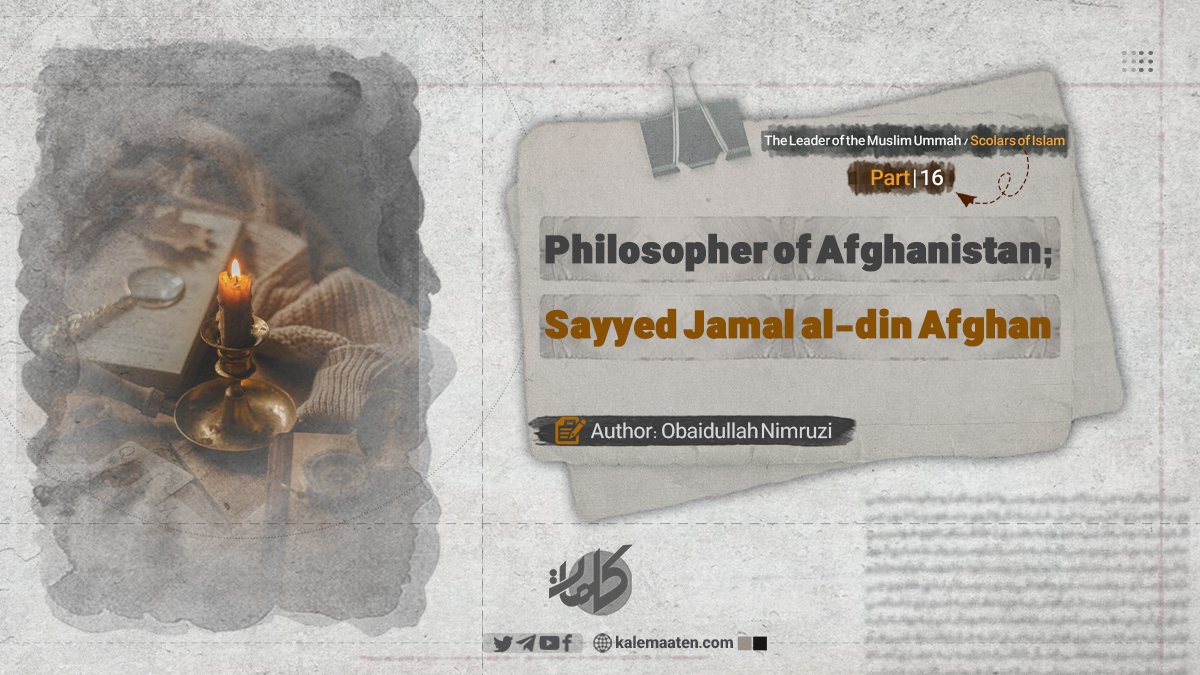
Author: Obaidullah Nimruzi
Philosopher of Afghanistan; Sayyed Jamal al-din Afghan (Part 16)
Sayyed Jamal al-din Afghan’s Influence on Freedom Movements
Sayyed Jamal al-din Afghan’s ideas had a profound impact on freedom movements in Islamic countries. One of his most significant influences was on the Constitutional Movement in Iran, where many intellectual and social leaders benefited from his teachings. Additionally, Sayyed Jamal al-din had an impact on anti-colonial movements in India, Egypt, and other regions, and his effects on the fight against colonialism were clearly visible.
Jamal al-din Afghan’s students, inspired by his reformist views, were able to initiate large and effective political and social movements throughout the Islamic world.
Jamal al-din Afghan: In Search of Unity and Awakening in the East
Given the chaotic and critical conditions of Eastern countries, Jamal al-din Afghan focused his thoughts deeply and comprehensively on the awakening and reform of Islamic nations. He stated:
“I concentrated my thoughts and ideas on one point, avoiding the dispersion of imagination, and looked towards the East, becoming deeply involved in its people.” He reflected on Afghanistan, the first land his body touched, then looked towards India, where his intellect matured. He considered Iran for its proximity and relations, and became preoccupied with the Arabian Peninsula, the Hijaz—the seat of revelation—and with Yemen and its surroundings, along with Najd, Iraq, Baghdad, and the biographies and works of Harun and Ma’mun. He examined the land of Syria and the dynamic politicians of the Umayyad period, ultimately reflecting on each Islamic state and pondering what had transpired in each. “I thought well. The East is the East; I engaged my intellect to understand the pain of the East and sought suitable remedies for it.”
This comprehensive and international approach reflects Jamal al-din’s deep understanding of the situation in the Islamic world. He recognized that any problem in an Islamic country has direct and indirect effects on other Muslim countries. Thus, he believed that comprehensive and unified solutions must be pursued to address the global challenges faced by Muslims.
Weaknesses of Islamic Societies and the Effects of Colonialism
Jamal al-din Afghan keenly identified the weaknesses of Islamic societies. One of the greatest weaknesses was the dispersion of ideas and internal disputes, rendering these societies unable to confront the challenges posed by colonial powers. He argued that colonialists exploited these internal divisions when attacking Islamic countries.
Sayyed Jamal al-din understood that if the Muslim people could not achieve unity and solidarity within themselves, colonialism would easily achieve its aims. Among the gravest internal issues was the tyranny and oppression of internal rulers, which led to what he termed “moral weakness” and “backwardness of thought.” Consequently, Jamal al-din endeavored to awaken the populace from their slumber and make them cognizant of both internal and external dangers.
The Mission of Awakening and Reform in the Islamic World
Jamal al-din Afghan viewed himself as committed to intellectual and political awakening within the Islamic world. He sought to liberate the Muslim people from superstitions and false beliefs, guiding them towards knowledge and awareness based on rational and reformist ideas. He believed that through intellectual awakening and political consciousness, the Muslim community could attain an independent and free state.
As Abdul Rahman Rafi articulates, “The East was subject to intellectual stagnation and petrification for many centuries—scientifically backward, politically enslaved, and deeply in slumber—until Allah the Wise raised up Jamal al-din Afghan, breathing into the nations of the East the spirit of awakening and new life.”
Jamal al-din Afghan: A Religious Reformer, Philosopher, and Politician
In the life of Jamal al-din Afghan, three fundamental characteristics are apparent: he was a religious reformer, a wise philosopher, and a political leader. As a religious reformer, he took on the responsibility of renewing and reforming the religion of Islam, advising the Muslim people to return to the original and natural principles of Islam and liberate themselves from superstitions and intellectual stagnation.
From a philosophical perspective, Jamal al-din played a similar role in the Islamic world as significant thinkers like Jean-Jacques Rousseau and Montesquieu did in Europe. He attempted to liberate ideas from the constraints of intellectual stagnation and imitation, steering people’s minds towards critical thinking. In this regard, Jamal al-din emphasized the importance of returning to rationality and avoiding blind adherence to the past.
Political Movements and Global Influence of Jamal al-din Afghan
In the political sphere, just as the leaders of freedom-seeking movements in the West, such as Washington, Garibaldi, Mazzini, and Cojot, energized political efforts, Jamal al-din Afghan instilled honor and dignity within the people. He taught the Muslim community that only through unity and solidarity could they withstand internal and external threats and understand the value of freedom.
Jamal al-din Afghan sowed the seeds of national and political movements across various regions in the East through his activism. The effects of these movements were particularly evident in Iran, Egypt, India, and other Islamic countries. He delivered a universal message promising all Muslims awakening, unity, and the pursuit of freedom and independence.
Continues…


